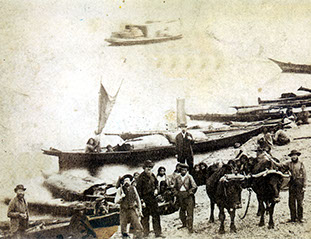 Although the Point Elliott Treaty was signed here in 1855, it was not ratified by the Congress until 1859 due to the divisive north-south politics in Washington, D.C. As soon as the ratification news arrived, Morris Frost and Jacob Fowler made the first official land claims in the area, which were recorded in 1860, the generally accepted date of the founding of Mukilteo. It was during his service as the customs officer in Port Townsend that Frost had recognized the trading potential of a site on Point Elliott. He persuaded Fowler, who was running a hotel at Ebey Landing on Whidbey Island, to join him in the new venture.
Although the Point Elliott Treaty was signed here in 1855, it was not ratified by the Congress until 1859 due to the divisive north-south politics in Washington, D.C. As soon as the ratification news arrived, Morris Frost and Jacob Fowler made the first official land claims in the area, which were recorded in 1860, the generally accepted date of the founding of Mukilteo. It was during his service as the customs officer in Port Townsend that Frost had recognized the trading potential of a site on Point Elliott. He persuaded Fowler, who was running a hotel at Ebey Landing on Whidbey Island, to join him in the new venture.
Frost had recommended Fowler for the job on Whidbey Island. In his mid-fifties, Frost had been active in politics in the Puget Sound region for nearly a decade, while Jacob Fowler, in his mid-twenties, was a relative newcomer. But both were from Dutchess County, New York, and they had very similar entrepreneurial ambitions. “Squire” Frost, as he liked to be called, was clearly the senior partner, but he accepted Fowler’s suggestion that the new settlement be named Mukilteo, an approximation of its Indian name.
The political backstory to the founding of Mukilteo involved competition between the old Jacksonian Democratic Party and the relatively new Republican Party. When the Territorial Legislature carved out in early 1861 a new county, Snohomish, the race was on to see which party would win out among the tiny number of eligible voters, that is, white male American residents. The founding of Mukilteo by the Democrats, Frost and Fowler, was clearly an effort to offset the Republicans who controlled the only other town in the county, Snohomish City (also called Cadyville). The legislature designated Mukilteo as the first county seat, but then the Republicans won the first election, 17-10, and moved the county seat to Snohomish City. For the next three decades, the two towns vied with each other for political power and patronage, even as Everett surpassed them both economically.
For a time Frost remained active in territorial politics, successfully seeking election as a territorial legislator in the House in 1862, 1867 and 1869. Fowler was more active in local politics, but both men poured much of their energy into developing Mukilteo through a variety of commercial ventures, with varying degrees of success. Neither founder realized their dream of a Mukilteo that would use its deep-water port and future railroad connection to dominate the region in the way that Seattle and, to a lesser extent, Everett has. Both died in modest circumstances, Frost in 1882 and Fowler in 1892, and both are buried in Mukilteo’s Pioneer Cemetery.
Copyright 2015, Mukilteo Walking Tour. All rights reserved.